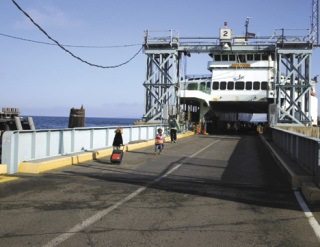State ferry officials — in an updated proposal delivered to the Legislature Saturday night — have recommended that the so-called triangle route that serves Vashon, Fauntleroy and Southworth get replaced by three separate runs serving the three communities.
Under a new version of Washington State Ferries’ long-range plan, two boats would serve the Vashon-Fauntleroy route, one boat would serve a Southworth-Fauntleroy route and the 34-car Hiyu would shuttle travelers between Vashon and Southworth.
The Hiyu, temporarily providing service on the Tahlequah-Point Defiance run, would be replaced on the south-end route by one of the new 64-car Island Home ferries under this scenario.
The proposal, called Plan A, is one of two put forward by the state ferry system. It was revised from a draft issued a month ago after ferry officials held 10 public hearings around the region, including one on Vashon that drew hundreds of Islanders.
Plan B, a more draconian effort to staunch the ferry system’s red ink, would maintain the north-end triangle but reduce service from three boats to two. It would also make the Hiyu the permanent boat on the south-end, retiring the 48-car Rhododendron, which is now in place.
The proposed break-up of the triangle was welcome news to Vashon’s ferry-service advocates, who have long complained about the cumbersome, three-dock system.
“It would be wonderful if it happens,” said Alan Mendel, who chairs Vashon’s ferry advisory committee.
The state ferry system has been working for months on its long-range plan, mandated by lawmakers because of their mounting concern over the ferry system’s financial straits. The ferry system’s costs have climbed in recent years because of rising fuel prices, an aging fleet and the need to build or replace car-holding areas at some of its docks. At the same time, it lost a significant chunk of revenue when the Legislature axed the motor vehicle excise tax, or car tabs.
Both of the scenarios ferry officials put forward in its long-range plan call for an additional infusion of state funds, although the costs of the two vary greatly.
Plan A, which makes only minor changes to the system, would require $3.3 billion in additional funding over the next 22 years. Plan B, which would reduce service considerably, would call for $1.3 billion in additional funding over the same time period.
“The revised draft plan begins the policy discussion, and presents for the communities, the Legislature and the Governor scenarios that seek to balance achievable service goals and funding requirements,” Paula Hammond, the state’s transportation secretary, said in a prepared statement. “We need to emerge from this legislative session with clear policy direction and a budget that sets a sustainable course for the future of the ferry system.”
Mendel was in Olympia on Monday testifying in favor of House Bill 1652, which would require the state to end its made-in-Washington rule for new ferries, another issue that has surfaced as ferry-service advocates have sought to find a way to reduce ferry costs without decreasing the current level of service.
The bill was introduced by Rep. Christine Rolfes (D-Bainbridge), who crafted it after hearing from citizens frustrated over WSF’s bidding process.
Since retiring the steel-electric ferries in 2007, WSF has awarded just one contract for a 64-car ferry.
In December WSF awarded Todd Shipyards a $64.5 million contract to build one Island Home ferry. Bidding was open only to Washington shipyards. Todd was the only company to bid, and its bid was millions more than WSF had estimated for the project.
The shipyards testified against the bill, noting that they offer quality workmanship, strong environmental standards and work for local people.
Mendel, when he testified, told lawmakers, “If they’re that good, what are they afraid of?”
Note: The Vashon ferry advisory committee’s next meeting is 7 p.m. Tuesday, Feb. 10, at McMurray Middle School.



